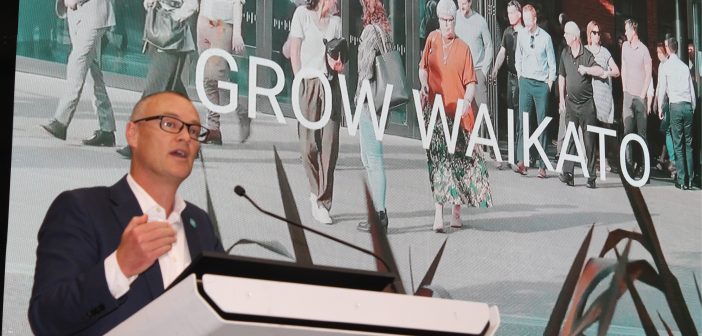The Government Minister responsible for developing a digital strategy for New Zealand says the Waikato has the opportunity for a bigger slice of the rapidly growing computer gaming sector.
Minister for Digital Economy and Communications, David Clark, told his audience at a Grow Waikato event that early work in his portfolio is coalescing around three themes.
“The first of those is trust. I think some of the work Gallagher is doing is a real illustration of the trust that we have around the world, people trust our products.”
Inclusion is another theme, and the third is growth. Clark cited the New Zealand computer gaming sector. “Every job in that sector is worth over $400,000 in export revenue. That’s pretty extraordinary. That’s an average. That is definitely an industry we want to continue to grow in New Zealand and, in fact, one that is growing rapidly. It’s about 42 percent per annum compounding growth in that sector.
“I know that there’s some really interesting exciting things going on here in Hamilton, as well, in that area in the Waikato. So I’m keen on ongoing conversations around that.”
Clark was part of a panel of speakers at Wintec’s Atrium, along with David Hallett from Company-X, Kahl Betham from Gallagher, Mike Jenkins and Ryan Joe from The Instillery, John Hanna from Ultrafast Fibre and Rob Vickery from Hillfarrance.
The growth theme sounded by Clark was also picked up by other speakers, while Waikato’s collaborative approach also featured at the event, which was organised by Hamilton East MP Jamie Strange.
Hallett said Waikato was increasingly recognised by people outside the region as a future hot spot for tech. He said a recent Te Waka survey of the tech sector showed 79 percent of respondents were selling services and products outside New Zealand and 35 percent of the respondent companies had at least one office offshore. “So these truly are global companies based here in the Waikato.”
He said growth comes from overseas people wanting to work with Waikato companies, and several factors attract them. One is fluency in English, which is “really important” as an international business language. New Zealand’s well aligned timezone with the US, particularly on its West Coast, is useful, as is the country’s ethical reputation. Further boosts come from New Zealand’s cost efficiency and ability to deliver.
“One of the things which is important to growth, if you look at any studies, is the ability to collaborate inside a market,” Hallett said.
He said Company-X was collaborating with a lot of the other organisations in the room. “And as an industry here in the Waikato, we collaborate through industry events, and also through industry initiatives and projects.”
Betham echoed Hallett’s message, as did other speakers. “One of the things that makes Waikato really special is a propensity to partner, to work together, to act as one large family,” Betham said.
“The heart we have as a region, how we work together, is going to propel us to the next level.”
Vickery said the Waikato doesn’t need to be a clone of anywhere else, and can build its own unique companies, while Jenkins said the region needed to be confident about telling its own story.
Hanna, who shifted to the Waikato two years ago, said he had been struck by the level of innovation, tertiary education, and how coordinated the region’s industries are. “The ability for the Waikato not just to stand on a national stage, but to punch way above on a global stage is absolutely real.”
Hallett did, however, sound a note of caution. “Unfortunately in the tech industry, we are under represented by females, which is really sad. The national average at the moment is 20 percent of all jobs in tech are filled by women, that means we are pretty much missing out on another 30 percent of our workforce that we could otherwise have.”
He said Company-X is working with Smart Waikato, through the secondary school employer partnership programme, to try to get year 10 girls interested in tech as a vocational pathway.
“It’s about increasing the opportunity and showing people there’s really, really cool things that can be done.”
Betham similarly said there needs to be a focus on recruitment and training. “When this export sector grows substantially and doubles in size, we are going to need a lot more people. And it’s going to take a really strong partnership between government, between private organisations, and education,” he said. “It’s a challenge for us all, how are we going to create this community?”





